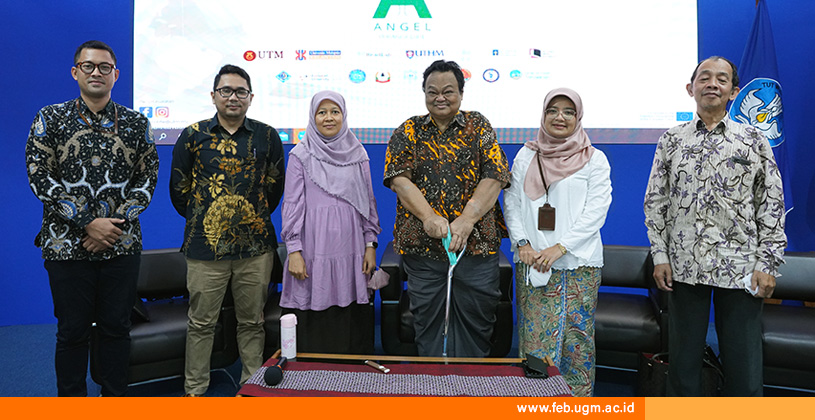Awaken the Spirit of Research on Research Dissemination Day 2022
- Details
- Written by Kirana
- Category: News
- Hits: 842

The Faculty of Economics and Business UGM (FEB UGM) in collaboration with the Accounting Laboratory, Economics Laboratory, Management Laboratory, and Economics and Business Research and Training (P2EB) held a seminar with the theme “Research Dissemination Day 2022” on Friday (9/12). The seminar was filled with research presentation activities by the FEB UGM academic community in collaboration with various partners ranging from MSMEs, village managers, and the government. Research Dissemination Day aims to convey to the public about research conducted by FEB UGM and is held in four event segments, namely plenary sessions, parallel sessions, poster presentations by students, and book chapter presentation sessions.
In the first segment which was held in the Auditorium Room of the FEB UGM Learning Center Building, namely the plenary session, there were five studies presented. The first is a research titled “Data Welfare Ranking Targeting the Acceleration of Extreme Poverty Elimination (P3KE)” by Wisnu Setiadi Nugroho, S.E., M.Sc., Ph.D. Ranking of Family Data Collection (PK) data is intended to identify which extreme poor groups need to be targeted for intervention. The second research titled as “Baseline Comparative Study of QUALITY INSPIRATION and SMART Activator Programs” by Eny Sulistyaningrum, S.E., M.A., Ph.D. This comparative research aims to measure and analyze the effectiveness of the impact of the PINTAR program by the Tanoto Foundation and the School Leadership Development Program by the INSPIRASI Foundation.
The plenary session continued with the third research, namely a project-based research titled as “ASEAN Network for Green Entrepreneurship Leadership (ANGEL)” initiated by Prof. Nurul Indarti, Sivilekonom, Cand.Merc., Ph.D. The ANGEL project aims to support college graduates and marginalized minority groups to gain a better livelihood through the green entrepreneurship they lead. The fourth research is research by Sony Warsono, MAFIS., Ak., CA., Ph.D., titled as “Transformation and Implementation of the Financial Management System for Village-Owned Enterprises.” This research responds and presents alternative solutions to three scopes of problems, which are education, village funds, and MSMEs. The last research in this session was titled “Innovation to Increase Tax Revenue in the Regions” which was presented by Akhmad Makhfatih, Dr., M.A.
Meanwhile, for parallel sessions there are eleven sessions with different themes in each session. Among the eleven themes of the session, there are FEB UGM Lecturer Research with Partners, Behavioral Studies and Human Capital, Green Economics and Islamic Business, Entrepreneurship and SMEs, and Response to Covid-19. In one theme, there were 5-7 studies by the FEB UGM academic community which were presented and discussed.
Furthermore, poster presentations by students were held to increase interest in research among students. One of the students who contributed to being part of the dissemination event was Naufal Mohamad Firdausyan, a 2019 undergraduate student in Economics. Naufal presented his research titled as “Bad Habits Lead to You: Risks Associated with Treated Diarrhea Among Under-Five Age Children In Indonesia.” Broadly speaking, Naufal's research is related to diarrhea and aims to solve problems in previous research datasets by changing the dependent variable because the previous questions used did not define diarrhea correctly.
When asked about his motivation for participating in this seminar, Naufal wanted to challenge himself and felt it would be a shame if the research he had done was not disseminated. “Maybe this event is a good opportunity for me to develop and so that this research can be recognized and also have implications for policy if it can be published in the end," he explained. Apart from that, he also felt that he got a lot of new insights about research methods by attending the whole series of events. “We can see how researchers construct models and understand them comprehensively, which is very valuable for students, especially final year students who want to do a thesis,” he said.
Reportase: Kirana Lalita Pristy.


